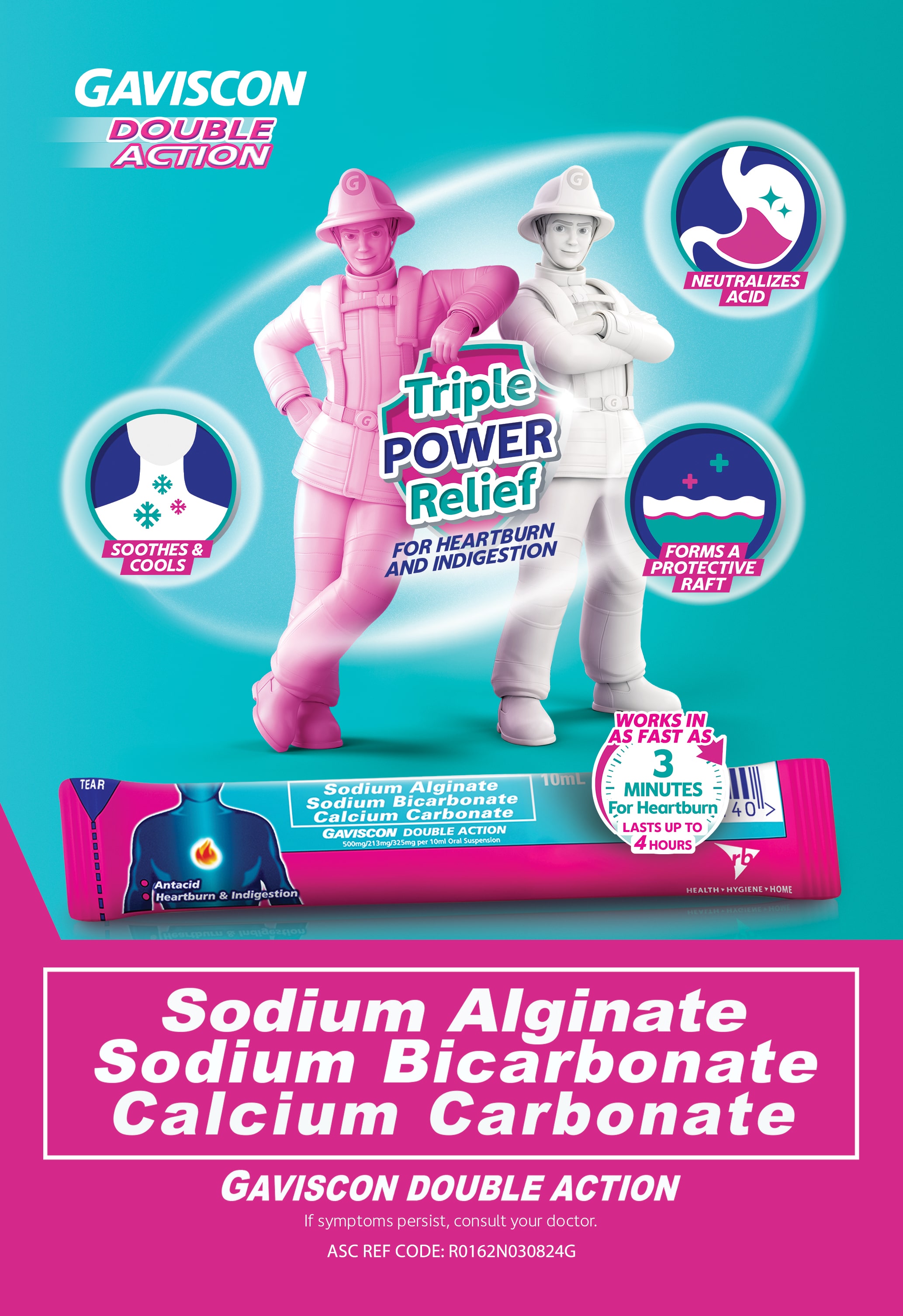What You Should Know about Acid Reflux Symptoms
Experiencing Acid Reflux symptoms shouldn’t put your life on pause. It’s a common condition among Filipino women1. The food we eat and stress can play a big part in the rise of hyperacidity and acid reflux symptoms.
Acid Reflux can first present itself as a burning sensation in your throat and chest. This is caused by acid from the stomach flowing backward passing through the esophagus and throat.
Acid Reflux: What is it and why does it happen?
Acid reflux usually occurs after meals or before bedtime. Acid is more prone to backflow when you’re lying down and when you’re relaxed. Since it doesn’t belong outside of the stomach, acid can irritate and inflame the tissues of your esophagus – which is lined from your chest up to your throat. The pain this produces is known as heartburn where the burning sensation can spread from the chest to the upper abdomen. This is a major symptom of acid reflux.
It’s important to note that acid reflux can worsen as you age, due to multiple factors such as decreased muscle tone, slower digestion, and other health conditions that require medication2. However, younger people can still experience acid reflux.
When acid reflux episodes happen repeatedly without treatment, it can progress into Gastroesophageal Reflux Disease (GERD). This can lead to the damage of the esophagus tissues and more serious illnesses. That is why it’s important to be aware of the signs of acid reflux and your own body’s triggers so you can get the help you need before it gets worse.

Photo by Puwadon Sang-ngern on Pexels
Watch out for the signs of Acid Reflux!
Acid Reflux can present itself as multiple symptoms but not limited to3:
- A burning sensation in the chest or throat
- A bitter or sour taste in the back of the throat
- It’s otherwise known as dyspepsia which is a common hyperacidity symptom
- Difficulty or pain in swallowing
- Due to the acid in your throat, you may later develop sore throat
- Burping
- You might feel the need to burp due to increased swallowing since you’re trying to keep the acid down.
- Nausea
- Too much acid in your esophagus can make you lose your appetite and make you feel queasy.
Acid Reflux can also present asthma-like symptoms such as coughing, wheezing, and shortness of breath due to particles entering your airways which make them contract more than usual.
The cause of your acid reflux may also affect the severity of your discomfort and pain. Furthermore, the above-mentioned hyperacidity symptoms may also worsen after bending over, smoking, or drinking alcohol.
What Causes Acid Reflux or Hyperacidity?
Each person has their own triggers of acid reflux. It may not be the same with other people especially when you’re an acidic person. That’s why it’s important to take note of what upsets your stomach and of course, to consult your doctor. But here are the most common triggers to watch out for:
- Fried and greasy food
- These increase the acid in the stomach and take quite a while to digest
- Overeating
- Eating plenty may take time to digest and can stimulate overproduction of stomach acid
- Eating too quickly
- Fatty food and dairy products
- Food that are high in fats, including dairy, stimulate your stomach to produce more acid.
- Spicy food
- Spicy food commonly contains
- Alcohol and soft drinks
- Caffeine and carbonation from drinks such as soft drinks and beer can cause the acid from your stomach to bubble up and enter the esophagus. Alcohol also has the tendency to relax your low esophageal sphincter (LES).
- Caffeinated products such as chocolate and coffee
- Besides the relaxing of your LES, caffeine can also increase the production of stomach acid. Try looking for low-caffeine options to replace your daily drinks.

Photo by Towfiqu barbhuiya on Unsplash
Causes of acid reflux are not limited to food and drink intake. Here are some other possible causes:
- Pregnancy
- The growing pressure and weight you carry can push, stretch, and weaken the LES. Pregnancy hormones in high levels such as relaxin, estrogen, and progesterone can also cause your LES to relax.
- Being overweight or obesity
- There’s an added pressure on your stomach which forces your LES valve to open after eating6.
There may also be other factors such as smoking and stress that can worsen your acid reflux symptoms. Smoking and second-hand smoke relaxes your lower esophageal sphincter (LES) and can trigger coughing. Smoking can also slow down digestion and in turn produce more acid in the stomach.
Stress may aggravate acidity symptoms because it depletes our supply of prostaglandins, which protect our stomachs from acid. Acid reflux may also be caused by age. For older people, their digestion slows which make their stomachs produce more acid. On the other hand, younger children may experience acid reflux due to their digestive systems not fully developing yet.
Furthermore, certain medications can also relax your LES. Consult your doctor to learn more about your medication and propensity to acid reflux.
Here are some Tips to Treat & Prevent Acid Reflux, Hyperacidity Symptoms
If you are experiencing sudden acid reflux episodes, here are some ways you can get relief:
- Take over-the-counter medication such as Sodium Alginate + Sodium Bicarbonate + Calcium Carbonate (Gaviscon) liquid sachet or tablets for triple power relief against acid reflux, heartburn, and indigestion.
- Sit up. Don’t lie down. When you’re lying down, gravity can actually help push acid upward from your stomach to your esophagus. This also puts pressure on your stomach which causes acid to backflow.
- Drink water. Frequent sips of water can help clear the acid that’s building up from your stomach to your throat.
If you are getting frequent acid reflux attacks, you may need long-term prevention which means lifestyle adjustments especially focusing on diet and exercise.

Photo by Karolina Kaboompics on Pexels
You can start small and incorporate mindful lifestyle adjustments in your daily routine.
- Be aware of your food triggers
Knowing what triggers your acid reflux can help you adjust your diet. You don’t have to restrict yourself but only know what to take in moderation.
- Maintain healthy weight
Losing excess weight can help decrease the pressure it places on your stomach and esophagus. For any weight concerns, it’s best to get advice from your doctor.
- Avoid overeating. Eat smaller meals.
When the stomach is full, reflux is more likely to happen. Try to observe what your stomach can or cannot take.
- Wait at least 3 hours after eating before lying down.
You can also help yourself by sleeping on an incline by elevating your head six to eight inches higher than your feet.
- Avoid smoking and drinking alcohol
- Minimize stress and get enough sleep
When stressed, you become more sensitive to stomach acid in the esophagus. Get enough sleep and get more exercise to release stress-relieving hormones.
- Have regular check-ups with your doctor
Beyond lifestyle adjustments, you must also get the proper medicine for acid reflux and hyperacidity. Finding the proper treatment for you will help make your life easier.

Photo by Antoni Shkraba on Pexels
How to get Acid Reflux Relief?
For triple power relief, take Sodium Alginate + Sodium Bicarbonate + Calcium Carbonate (Gaviscon). It soothes and cools the food pipe (or the esophagus), neutralizes excess acid, and forms a protective raft so that acid and food won’t go up the lower esophageal sphincter (LES).
See our recommended product line for acid reflux remedy
- Sodium Alginate + Sodium Bicarbonate + Calcium Carbonate (Gaviscon) Liquid Sachet
- Sodium Alginate + Sodium Bicarbonate + Calcium Carbonate (Gaviscon Double Action) Liquid Sachet
Dosage of Liquid Sachets:
For adults and children 12 years and above, take one to two 10ml sachets after eating and at bedtime, up to four times a day. For children below 12 years old, consult your pediatrician before administering.
- Sodium Alginate + Sodium Bicarbonate + Calcium Carbonate (Gaviscon) Tablets
- Sodium Alginate + Sodium Bicarbonate + Calcium Carbonate (Gaviscon Double Action) Tablets
Dosage of Tablets:
For adults and children 12 years and above, take two to four tablets after meals and at bedtime, up to four times a day. For children below 12 years old, consult your pediatrician before administering.
Before intake, make sure to always read the label! This medicine contains sodium and calcium. If you have been advised to follow a diet restricted in either of these salts, please consult your doctor before taking it. Also, do not use this product after the expiry date (month/year).
Aside from medication, there are still a few home remedies you can do to alleviate the symptoms of acid reflux.
- You may elevate your head in your sleeping position and have gravity by your side, helping reduce acid go up your esophagus.
- Drink water to clear some of the acid in your throat.
But if these symptoms persist, it’s best to consult your doctor.

Treatment
We know how disruptive acid reflux can be, which is why our range is designed to prevent discomfort. Our products create a protective barrier that prevents acid - and other aggressors like pepsin and bile - from moving up the esophagus.
The viscous formulation at the heart of our range (Gaviscon Original and Double Action) is sodium alginate, while our products also contain antacids, which neutralizes acids.
Together, Gaviscon products offer powerful relief, allowing you to take your life off pause.
Dosage: Take 10-20ml (1-2 sachets or 2-4 tablets) after meals and at bedtime.
All information presented is not meant to diagnose or prescribe. If symptoms are severe or prolonged you should consult a doctor or pharmacist. Always read the label.
Recommended Product
Frequently Asked Questions (FAQs)
Acid Reflux shouldn’t hinder you from your daily life. Discover how Sodium Alginate + Sodium Bicarbonate + Calcium Carbonate (Gaviscon) can further help you with your acid reflux or hyperacidity symptoms.
All information presented is not meant to diagnose or prescribe. If symptoms persist, consult your doctor. Always read the label.
Sodium Alginate + Sodium Bicarbonate + Calcium Carbonate (Gaviscon) is available in pharmacies and drugstores nationwide. You can also shop online in our official stores.
References:
- GERD, UTI, hormonal imbalance among Filipinas' most common health concerns, available at https://www.philstar.com/lifestyle/health-and-family/2023/05/22/2267254/gerd-uti-hormonal-imbalance-among-filipinas-most-common-health-concerns. Accessed on September 24, 2024.
- Why Does Heartburn Get Worse as You Age?, available at https://health.clevelandclinic.org/why-does-heartburn-get-worse-as-you-age. Accessed on September 24, 2024.
- Symptoms & Causes of GER & GERD, available at https://www.niddk.nih.gov/health-information/digestive-diseases/acid-reflux-ger-gerd-adults/symptoms-causes. Accessed on December 9, 2024.
- Acid Reflux & GERD, available at https://my.clevelandclinic.org/health/diseases/17019-acid-reflux-gerd. Accessed on September 24, 2024.
- The Health Risks of Eating Extremely Spicy Foods, available at https://health.clevelandclinic.org/health-risks-of-spicy-food. Accessed on February 11, 2025.
- GERD & Obesity, available at https://www.uchicagomedicine.org/conditions-services/esophageal-diseases/gastroesophageal-reflux-disease/gerd-and-obesity. Accessed on September 24, 2024.
- Everything You Need to Know About Acid Reflux and GERD, available at https://www.healthline.com/health/gerd#symptoms. Accessed on September 24, 2024.
- 9 at-home Treatments for Acid Reflux, available at https://www.health.harvard.edu/newsletter_article/9-ways-to-relieve-acid-reflux-without-medication. Accessed on September 24, 2024.
- What to Drink for Acid Reflux, available at https://www.healthline.com/health/gerd/beverages#drinks-for-acid-reflux. Accessed on September 24, 2024.
- Strugala V., et.al. (2010). A Randomized, controlled, crossover trial to investigate times to onset of the perception of soothing and cooling by over-the-counter heartburn treatments. Journal of International Medical Research. 38(2):449-57. Available at https://doi.org/10.1177/14732300100380020. Accessed on December 9, 2024.
- Strugala, V., et.al. (2012). Assessment of the Safety and Efficacy of a Raft-Forming Alginate Reflux Suppressant (Liquid Gaviscon) for the Treatment of Heartburn during Pregnancy. ISRN Obstetrics and Gynecology, 1–6. Available at https://doi.org/10.5402/2012/481870. Accessed on December 9, 2024